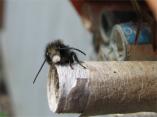I spend a lot of time thinking about waste. (And wonder: is this a waste of my time?)
Waste is inescapable in this culture, and we need to be talking and acting more decisively. Rubbish is engineered into every product we pick off a shelf. How much money have I wasted buying things that didn’t work, that didn’t last? What further damage are we doing to our environment by our willingness to live the throwaway life?
Waste doesn’t stop with the craziness we call consumerism; it’s patterned into our style of eating as well. Truly ethical meat eating demands that we use the entire animal if we kill one for food. My sister-in-law told me a hair-raising tale of an acquaintance who buys whole pre-cooked broiler chickens for her family, cuts the breast meat off and throws the rest into the garbage because nobody in her family will eat anything but white meat. Such people, in my opinion, don’t deserve to eat meat at all.
However. This article about nose to tail cooking concentrates on one body part that those raised on safely anonymous chicken nuggets or pre-formed luncheon meat will have particular problems preparing. Not so the bold souls at The Punter in Cambridge, whose Lamb Fries I had reported on back in November.
Some groups feel strongly enough about commercial food waste to do something about it. On my course in Italy we learned about Last Minute Market, which whisks unwanted food away from Italian supermarkets and processes or redistributes it. Second Harvest does this in Canada.Back in November, some plucky Londoners threw a free lunch for 5,000 to raise awareness about food waste.
It’s never too early to start preparing ourselves for Waste Reduction Week, coming up in October. There are so many things we could do. How about bringing your own container for takeaways? Takeoutwithout is a great idea in Toronto; you can do your own thing by investing in a tiffin box and taking that. One British journalist experimented with the concept of shopping packaging-free a couple of years ago; and another offered 20 suggestions for reducing food waste. Our own David Suzuki has a few ideas as well. In the commercial kitchen, frugal is finding new panache among San Francisco’s chefs, according to this article.
People can educate themselves about using food they would otherwise have wasted, as this article shows, or learn to understand what the “best before” date means – because it’s not an arbitrary line after which your food will go bad.
Freegans and Freecyclers have understood this for a while. In her book Farm City, Novella Carpenter describes how she foraged in dumpsters and garbage bins to feed her urban animals. But there’s good, edible food in there still fit for humans too. In fact, here’s an excellent letter (originally written to the editors of Monday Magazine) from a resident of the Fernwood neighbourhood in Victoria, who watches waste more closely than most.
From: Edward Butterworth
Date: February 17, 2012
Subject: dumpster demiseDear Editor,
It is with great sadness that we, the Fernwood Urban Gleaners Group, note the passing of possibly the last major open dumpster in Victoria, outside Thriftys Hillside supermarket this week. It was our ‘golden’ dumpster, reliably supplying us enough good food to feed ten or more hungry mouths. We expect it to be replaced with a second locked compactor, as exist at all the other large supermarkets in town, thus ensuring that surplus food goes to waste.
Far be it from us to moralize about Thriftys’ behaviour. They are locked into a system which make such waste inevitable. I have no doubt that their decision was an ‘economic’ one with moral implications not even discussed. What I question is the narrow view of economic decisions, that don’t see waste in a world of scarcity, that don’t see degradation and pollution of the environment as debts being accumulated. It is not a moral shortfall but lack of consciousness, a sort of blindness to the consequences of our actions, to the fact that humanity is on the brink of paying these debts. Every plastic tub of yoghurt, sour cream, salsa, hummus, etc. we salvaged was recycled, saving them from the landfill.
I joked that dumpster diving was the best paid job I ever had. Organic fruit and veg., half a dozen $35 spiral sliced hams, boxes of organic yoghurt, milk, bulk nuts, artisan bread… One night I opened a garbage bag to find $400-worth of gourmet imported cheese. For a week I was the cheese fairy, dealing out exotic French cheese to all and sundry. It was the dumpster land of milk and honey too good to last, I suppose, in this world of impermanence.
So many people thought we were taking undue risks eating discarded food. But I have spent years wandering the third world and understand the rudiments of hygiene and food safety. Foodsafe is about ensuring zero liability and thus errs heavily on the side of caution. Cheese, for example, goes mouldy at a certain point, but unlike with bread, the mould can be cut off leaving the rest of the cheese good to eat. There was no sign of mould on any in that bag. There is still cheese in my fridge that was gleaned a month ago. I consider myself well-informed enough to take responsibility for my own body and what I put into it.
While I feel gratitude for the gift that was this brief window of abundance I am impatient to see change in this society. For example, while we enthusiastically recycle all plastics that come over our doorstep, supermarkets and all businesses are free to dump them with impunity and do so in huge quantities. I want to see regulations to stop this. Businesses would whine that this would undermine their profitability but with a level playing field they would just pass on the increased costs to consumers. Then we would begin to pay the real costs of what we consume without generating environmental debt. In a world where a billion people go hungry, in a society where homelessness is on the increase and people are expected to live on $650 a month on welfare, I want to see laws prohibiting such waste of food.
It was taboo when I was young.
Edward Butterworth
Had enough? If not, here are a few more links:
Food Waste in Canada (November 2010)
Why Wasting Food Wastes Nature (May, 2011)
Redirecting food waste (March 2011)










One Response to A lot of words on waste